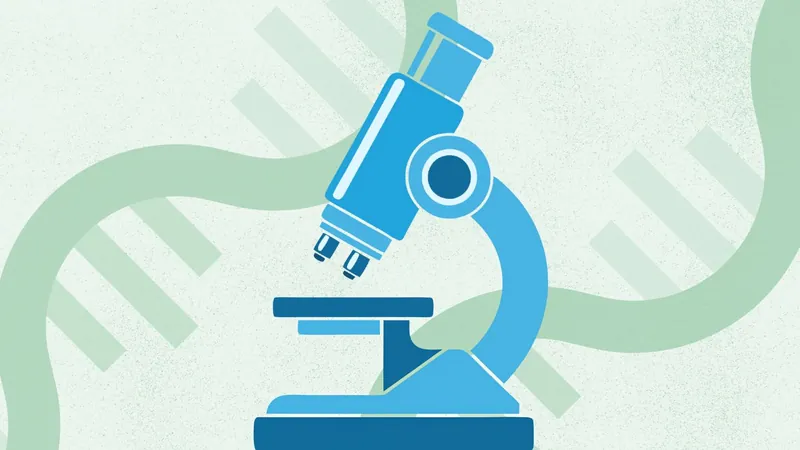
Groundbreaking Study Reveals Four Distinct Types of Autism
2025-07-16
Author: Li
A Major Leap in Autism Research
In a revolutionary new study, researchers from the Icahn School of Medicine at Mount Sinai have identified four distinct types of autism, challenging the previous notion that autism spectrum disorder is a singular condition. Dr. Jennifer Foss-Feig, a coauthor and leading psychologist, emphasizes the significance of this discovery: "This research highlights that there are indeed different types of autism that carry different clinical, genetic, and biological profiles."
Understanding the Spectrum
Dr. Foss-Feig elaborates that this study provides answers to the long-pondered question of why individuals with autism can present such varying developmental, behavioral, and support needs. By analyzing data from over 5,000 autistic children across the U.S., researchers utilized a people-centered methodology to classify individuals based on more than 230 traits.
Introducing the Four Subtypes
The findings revealed four new subtypes of autism, each with unique characteristics: 1. **Social and Behavioral Challenges** (37% of participants): This group faced social difficulties and repetitive behaviors but reached developmental milestones at similar rates to peers without autism, often with accompanying conditions such as ADHD or anxiety. 2. **Mixed ASD With Developmental Delay** (19%): These children typically experienced delays in developmental milestones without significant psychiatric conditions, though some exhibited repetitive behaviors and social challenges. 3. **Moderate Challenges** (34%): Representing core autism behaviors but less severely, this group generally reached milestones in line with their non-autistic peers without additional psychiatric issues. 4. **Broadly Affected** (10%): Individuals in this group displayed severe and wide-ranging difficulties, including pronounced developmental delays, social challenges, and psychiatric co-occurring conditions.
Genetic Insights and Personalized Medicine
Crucially, the study also connects these subtypes to specific genetic mutations and biological pathways, laying the groundwork for personalized treatment approaches. Dr. Foss-Feig notes, "Understanding the genetic factors involved can lead to tailored interventions based on individual profiles." Children in the Broadly Affected group showed the highest levels of genetic variation linked to autism, suggesting that while they share symptoms, their underlying biology may differ greatly.
Looking Ahead: Future Research and Implications
While the results are promising, experts like Dr. Olga Troyanskaya call for further research to explore these subtypes in adults and across more diverse populations. "This study is a foundational step toward redefining how autism is diagnosed and treated, but future studies are critical to validate these findings," she asserts.
Autism: A Complex Spectrum
The research underscores that autism should be viewed as a complex, multidimensional condition rather than a straightforward line of severity. "As new data emerges, we anticipate refining these subtypes and identifying even more," Foss-Feig adds. Kristyn Roth from the Autism Society of America reinforces this sentiment, stating, "Autism is not a uniform experience but a diverse spectrum with varying presentations and support needs.”
Toward Better Diagnoses and Treatments
Armed with this new understanding, clinicians can provide more accurate diagnoses that reflect individual developmental paths and symptoms. The ultimate hope is that these clearer, more precise definitions of autism will lead to more effective treatment and support strategies tailored uniquely to each individual.

 Brasil (PT)
Brasil (PT)
 Canada (EN)
Canada (EN)
 Chile (ES)
Chile (ES)
 Česko (CS)
Česko (CS)
 대한민국 (KO)
대한민국 (KO)
 España (ES)
España (ES)
 France (FR)
France (FR)
 Hong Kong (EN)
Hong Kong (EN)
 Italia (IT)
Italia (IT)
 日本 (JA)
日本 (JA)
 Magyarország (HU)
Magyarország (HU)
 Norge (NO)
Norge (NO)
 Polska (PL)
Polska (PL)
 Schweiz (DE)
Schweiz (DE)
 Singapore (EN)
Singapore (EN)
 Sverige (SV)
Sverige (SV)
 Suomi (FI)
Suomi (FI)
 Türkiye (TR)
Türkiye (TR)
 الإمارات العربية المتحدة (AR)
الإمارات العربية المتحدة (AR)